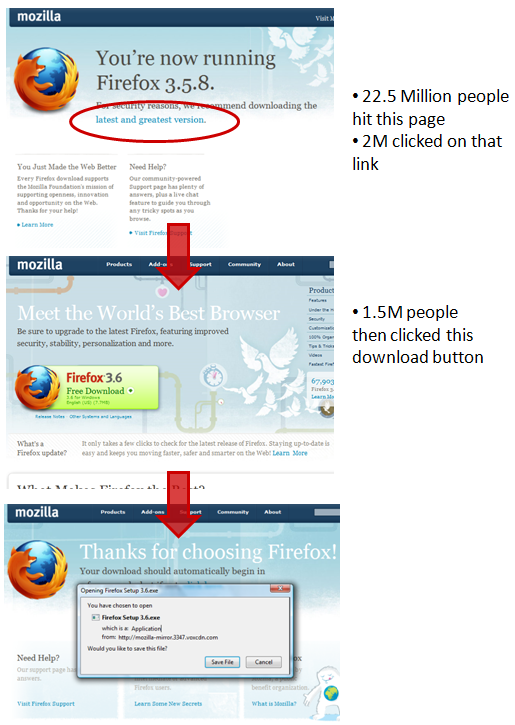As Daniel pointed out, there has always been a dramatic increase in fresh downloads/installs of Firefox at the time of each minor version release – separate from people simply being updated. We’ve never entirely understood this user behavior until Daniel started some digging yesterday. Here’s what we know…
- Yesterday (just after 3.0.18 and 3.5.8 were released) we saw a spike in fresh downloads/installs of Firefox. The typical daily number is in the ballpark of 2 Million and yesterday it shot up to over 4 Million.
- As Daniel highlighted, nearly all of the download activity was for Firefox 3.6.
- Digging a little deeper, we also discovered that the entire spike in 3.6 downloads was coming from people on Firefox 3.5.8. This means people successfully got the update yesterday (3.5.8), and then went out of their way to manually do one further update (i.e., get 3.6).
Why or how is this happening?
It turns out that the answer was right under our nose. When people get an update, they see an update page. And if they’re not on the current major version (e.g., 3.6), the page suggests that they go and download the lastest and greatest. So, what happened within this user interaction yesterday?

So, this explains a common experience for millions of users each time a Firefox update is shipped. And it’s good to see the messaging on that 3.5.8 update page (and all older update pages) is paying off. Perhaps we should consider changing the concept of those pages to be even more aggressive in getting people to update to the latest and greatest.
Michael Lefevre wrote on
:
wrote on
:
Justin Dolske wrote on
:
wrote on
:
alanjstr? wrote on
:
wrote on
:
Kyle wrote on
:
wrote on
:
Robert Kaiser wrote on
:
wrote on
:
Dan wrote on
:
wrote on
:
Jesper Kristensen wrote on
:
wrote on
:
Nirbheek Chauhan wrote on
:
wrote on
:
Jim wrote on
:
wrote on
:
Simon wrote on
:
wrote on
:
Alex Faaborg wrote on
:
wrote on
:
Thane Sherrington wrote on
:
wrote on
: